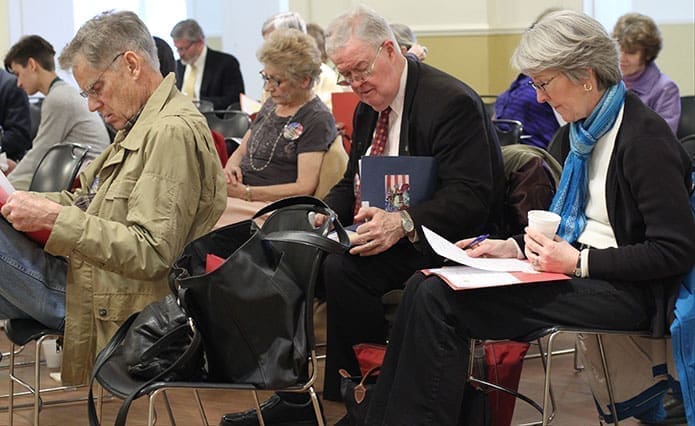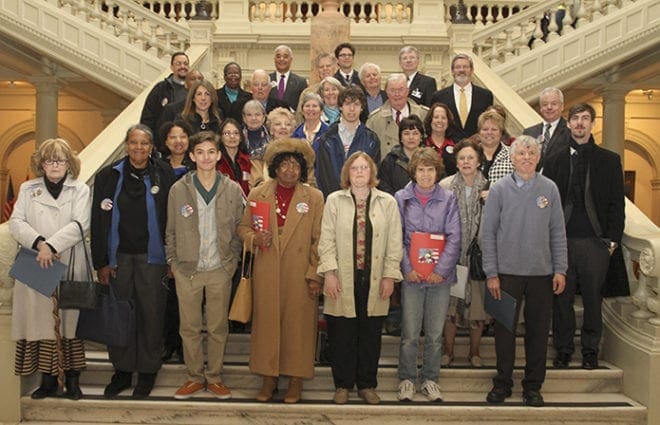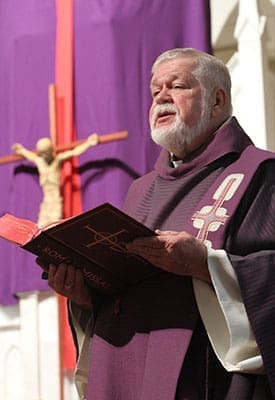 Photo By Michael Alexander
Photo By Michael AlexanderAtlanta
‘Capitol day’ guides legislative newcomers in navigating Georgia Assembly
By NICHOLE GOLDEN, Staff Writer | Published March 20, 2014
ATLANTA—Mass at the Shrine of the Immaculate Conception in Atlanta and encouragement from Msgr. Henry Gracz helped participants in the March 6 Catholic Day at the Capitol to jumpstart their morning.
In his homily, Msgr. Gracz told those gathered to bring the Gospel and its joy when they went to speak to their legislators that day.
“Let that peace of Christ reign in your hearts,” he said.
Twenty-five Catholics attended the program of education and legislative lobbying. The eighth annual Catholic Day at the Capitol, sponsored by the Georgia Catholic Conference, had been rescheduled due to the February ice storm.
Following Mass, participants assembled in the Shrine’s basement to hear an update on legislative issues and the process of visiting legislators.
Frank Mulcahy, executive director of the Georgia Catholic Conference, which represents the bishops of the Atlanta Archdiocese and the Savannah Diocese, opened the program with prayer.
Most of the Catholic Day participants were from various Atlanta area parishes. Sister of Mercy Joan Serda traveled from Macon, part of the Diocese of Savannah.
“What you are going to see is the legislative branch of Georgia in action,” said Mulcahy.
Each participant received a folder with a summary of pending legislation being followed by the conference, the names of their representative and senator, and cards to help them contact lawmakers.
Ideally, concerned citizens should remain in contact with their lawmakers throughout the year, especially while bills are in committee, Mulcahy said. Compromises to legislation are often reached at the committee level.
“It’s where we do most of our work,” said Mulcahy.
If you wait until a bill has gone to the floor, it’s too late, he added.
During the 2014 legislative session, Mulcahy closely monitored several issues of concern, including prohibiting abortion funding in health care exchanges set up under the Affordable Care Act, gun control, religious liberty, parental choice in education and immigration.

Catholic Day at the Capitol participants pose for a photo on the north interior steps of the Georgia State Capitol on March 6. Photo By Michael Alexander
Mulcahy acknowledged there can be a bit of anxiety when preparing to speak with lawmakers in person.
“A lot of people get a little uncomfortable with that,” he said.
Catholic Day participants could choose to send a message with a page into the House or Senate chamber, and then have a conversation “across the velvet rope,” an area cordoned off outside each chamber, with their representative. Another means of communication is to leave a card at the legislator’s office. The representative’s staff records any type of constituent communication, whether it’s written, received by email or phone.
Mary Boyert, director of the archdiocese’s Respect Life Ministry, suggested that participants select just one issue on which to focus attention when speaking with legislators due to time constraints.
Boyert provided an update on Senate Bill 98 prohibiting abortion funding in the health care exchanges set up by the Affordable Care Act. SB 98 also would place into law the prohibition of tax funds being used to cover abortions for state employees. The measure passed the Senate and was being debated in the House March 6.
“Our taxpayer money is paying for some abortions,” said Boyert regarding the Affordable Care Act, often referred to as Obamacare.
Those who sign up for insurance through an exchange may not realize that coverage for abortion is included until afterward, said Boyert. She also explained that while Gov. Nathan Deal ordered an administrative fix to prevent taxpayer-funded abortions under the state health benefit plan, this bill would make that law.
Boyert encouraged support of SB 98 and to “oppose any efforts to make it weaker.”
Boyert also spoke about other pro-life issues. While there was no legislation introduced regarding the death penalty in this session, “we would like to see Georgia stop the death penalty,” she said.
Participants were also interested in hearing about the status of House Bill 875, which intends to loosen gun restrictions at various locations in Georgia, including churches. The Georgia Catholic Conference joined other religious leaders in opposing the bill. It passed the House and was being considered in the Senate.
Ethan Fain, 15, was participating in Catholic Day for the first time. A parishioner at Good Shepherd Church in Cumming, Fain is preparing for confirmation and trying to become more aware of the church’s teaching on issues.
“I just kind of want to observe,” said Fain, accompanied by his mother, Gema.
Cecilia Peirce, of St. Benedict Church in Johns Creek, was also attending to familiarize herself with the state legislative process. Peirce, who came to the United States from Canada, recently earned the right to vote.
“I just became a citizen two years ago,” she said.
“Your voice makes a difference,” said Kat Doyle, director of archdiocesan Justice and Peace Ministries. Doyle reminded participants that it’s important to stay in touch with lawmakers beyond the session, which was scheduled to end March 20.
“We can help you. Very few people take the time to do it,” she said.
After the presentation, the new lobbyists braved the blustery weather to walk to the Capitol to observe debate in progress.
Sister Joan and Mercy Associate Jane Kennedy, a parishioner of St. James the Apostle Church in McDonough, were both hoping to talk with their representatives in person.
Sister Joan added that she is passionate about the expansion of Medicaid in the state for those in need.
“You don’t get the same care,” she said about free clinics for the uninsured.

Msgr. Henry Gracz, pastor of the Shrine of the Immaculate Conception, Atlanta, serves as principal celebrant for the Mass at the Shrine to mark Catholic Day at the Capitol, March 6. Photo By Michael Alexander
Immigration is an important issue to Kennedy, who moved to Atlanta in 2011 from Arkansas. Kennedy suggested that anyone wanting to learn more about the church’s teaching on immigration turn to the writings and recorded homilies of Bishop Anthony Taylor of the Diocese of Little Rock.
“It’s a huge issue,” said Kennedy.
The Georgia Catholic Conference had been working for passage of SB 312, the New Americans Act. The bill would have required the state Department of Human Resources to identify and assist legal immigrants in obtaining citizenship through the naturalization process. However, SB 312 failed to cross over to the House of Representatives in time for consideration this session.
Deacon Tom Pupo of St. Thomas Aquinas Church, Alpharetta, decided to leave a note for his representative, Rep. Jan Jones, speaker pro tempore.
Accompanied by Doyle and other Catholic Day participants, Deacon Pupo left correspondence regarding support of SB 98 with Jones’ staff.
“That may be the difference,” noted Doyle. “That’s why it’s so important to do what we just did today.”
“Hopefully so,” added Deacon Pupo.
Later in the day, Catholic Day advocates discussed issues ranging from the legalization of medical marijuana, the death penalty, and the gun legislation to a variety of social justice topics.
“The participants were thoughtful and engaged and contributed to the process of government by discussing issues in light of the Gospel and interacting with their elected senators and representatives,” wrote Mulcahy in a weekly online legislative update. “We appreciate their attendance and their spirit of generosity.”
For a summary of how important bills fared in the last days of the session, visit the Georgia Catholic Conference at http://www.georgiacc.org